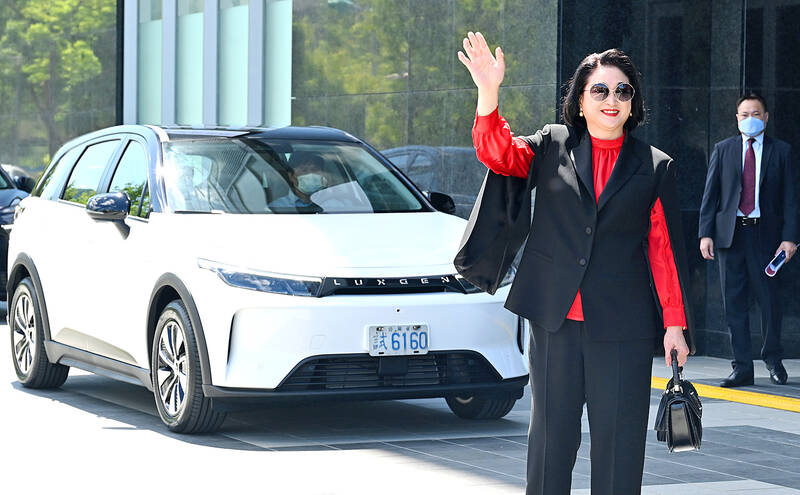Foxtron Vehicle Technologies Co (鴻華先進), an electric vehicle development venture between Hon Hai Precision Industry Co (鴻海精密) and Yulon Motor Co (裕隆汽車), yesterday said it is on schedule to deliver its new electric vehicle, the Model C, but the vehicle’s commercial launch will hinge on the decision of its first customer, Luxgen Motor Co (納智捷汽車).
Foxtron’s statement came after Yulon president Yao Chen-hsiang (姚振祥) told reporters on Thursday that it would be a challenge for the automaker to ship the latest electric model, code-named the Luxgen N7, to Luxgen at the end of this year. Yulon is in the process of conducting a series of tests including safety tests on the new all-electric sports utility vehicle, Yao said.
The Luxgen N7 is based on the Model C prototype developed by Foxtron. Yulon, the parent company of Luxgen, manufactures electric vehicles for Luxgen and some gasoline-fueled cars for Nissan Motor Corp. Since Luxgen started taking preorders in September last year, the company has received about 20,000 preorders for the N7 model, which carries a price tag of about NT$1 million (US$30,990.45), which is less than prices of other electric vehicles on the market.

Photo: Yen Chen-hui, Taipei Times
Foxton said in a statement that “the development of the Model C progresses well on schedule.”
It plans to deliver the model to its customers as previously arranged, it said.
However, the launch of the Luxgen N7 should follow Luxgen’s plan, the statement said.
The Model C was slated to enter mass production in the fourth quarter of this year, Hon Hai said earlier this year.
Hon Hai targeted 10 percent of the nation’s new car market at about 200,000 units per year, company chairman Young Liu (劉揚偉) told investors in May.
Liu doubles as chairman of Foxtron.
Foxtron in July received approval from the Taiwan Stock Exchange to trade its stocks on the Taiwan Innovation Board, a secondary market that gives local start-up companies easier access to capital for business development. The approval paves the way for the debut of Foxtron shares later this month.
Foxtron reported a loss of NT$540.86 million in the first quarter of this year, according to the Taiwan Stock Exchange. The company saw its losses widen to NT$1.58 billion last year compared with losses of NT$983.1 million in 2021, the report showed.

STEEP DECLINE: Yesterday’s drop was the third-steepest in its history, the steepest being Monday’s drop in the wake of the tariff announcement on Wednesday last week Taiwanese stocks continued their heavy sell-off yesterday, as concerns over US tariffs and unwinding of leveraged bets weighed on the market. The benchmark TAIEX plunged 1,068.19 points, or 5.79 percent, to 17,391.76, notching the biggest drop among Asian peers as it hit a 15-month low. The decline came even after the government on late Tuesday authorized the NT$500 billion (US$15.2 billion) National Stabilization Fund (國安基金) to step in to buoy the market amid investors’ worries over tariffs imposed by US President Donald Trump. Yesterday’s decline was the third-steepest in its history, trailing only the declines of 2,065.87 points on Monday and

TAKING STOCK: A Taiwanese cookware firm in Vietnam urged customers to assess inventory or place orders early so shipments can reach the US while tariffs are paused Taiwanese businesses in Vietnam are exploring alternatives after the White House imposed a 46 percent import duty on Vietnamese goods, following US President Donald Trump’s announcement of “reciprocal” tariffs on the US’ trading partners. Lo Shih-liang (羅世良), chairman of Brico Industry Co (裕茂工業), a Taiwanese company that manufactures cast iron cookware and stove components in Vietnam, said that more than 40 percent of his business was tied to the US market, describing the constant US policy shifts as an emotional roller coaster. “I work during the day and stay up all night watching the news. I’ve been following US news until 3am

Six years ago, LVMH’s billionaire CEO Bernard Arnault and US President Donald Trump cut the blue ribbon on a factory in rural Texas that would make designer handbags for Louis Vuitton, one of the world’s best-known luxury brands. However, since the high-profile opening, the factory has faced a host of problems limiting production, 11 former Louis Vuitton employees said. The site has consistently ranked among the worst-performing for Louis Vuitton globally, “significantly” underperforming other facilities, said three former Louis Vuitton workers and a senior industry source, who cited internal rankings shared with staff. The plant’s problems — which have not

TARIFF CONCERNS: The chipmaker cited global uncertainty from US tariffs and a weakening economic outlook, but said its Singapore expansion remains on track Vanguard International Semiconductor Corp (世界先進), a foundry service provider specializing in producing power management and display driver chips, yesterday withdrew its full-year revenue projection of moderate growth for this year, as escalating US tariff tensions raised uncertainty and concern about a potential economic recession. The Hsinchu-based chipmaker in February said revenues this year would grow mildly from last year based on improving supply chain inventory levels and market demand. At the time, it also anticipated gradual quarter revenue growth. However, the US’ sweeping tariff policy has upended the industry’s supply chains and weakened economic prospects for the world economy, it said. “Now